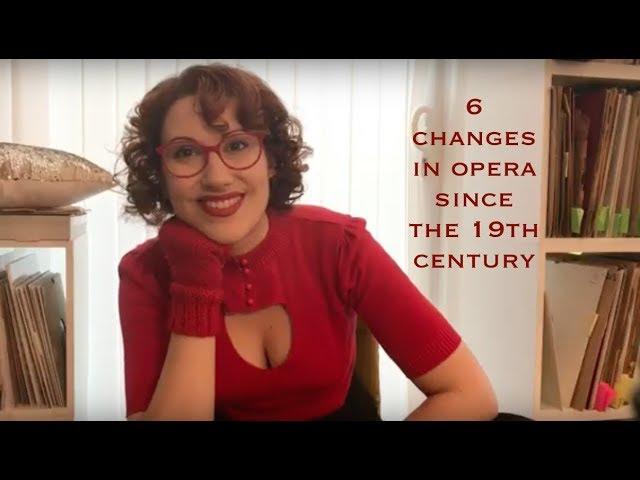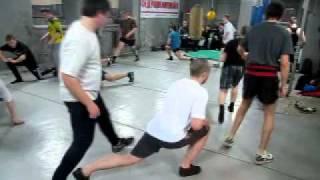
Opera used to sound very different! Here’s how...
Комментарии:

Thank you!
Ответить
Decadence means something.
The opera industry has destroyed Bel Canto.

Netrebko, Kaufmann…painful
Ответить
This is very insightful and inspiring. It is clear how it applies to the Italian style-- but what about Wagner?
Ответить
Fernando de Lucia almost brought me to tears
Ответить
I just loved Fernando de Lucia's voice... I'm an ex opera singer - now in my 70's but still love to sing... ... I think many modern singers sound as though they are shouting the music - it seems that to express emotion they have to writhe around and yell... sigh.
Ответить
Silly comparison of ancient recordings, barely discernible, to the modern ones. And this super-posh accent to be more intellectual. There is some truth in it, but please….
Ответить
Well i don't really like the older singing but at least you can understand the words :)
Ответить
I had this old school music textbook, and it recommended focusing on drawing out the vowels and spending less time on the consonants.
Ответить
Excessive vibrato. YUCK!!
Utterly poor technique to me. If don't hit the note and keep on the note with only a little variation to stop it sounding robotic and artificial then that's a bad performance. Probably the worst ones for this are the sobbing tenors.

Many thanks. How necessary it is to talk about this. I feel enormous nostalgia for what we are losing.
Ответить
My ear isn't good enough to recognize the differences of what you are pointing out.
Ответить
As a huge fan of early opera recordings, I thank you for identifying and explaining the specific aspects of the singing of that era that contrast with modern-day approaches. Brava!
Ответить
But what makes you so sure that Mozart intended this duet to be sung legato? Do you have evidence? Wasn’t this written well before Bel Canto? the Eames & de Gorgoza recording actually sounds slow and actually a bit boring, considering what is dramatically going on in Don Giovanni.
Ответить
The best legato singing I have ever heard was Jon Vickers as Florestan ar Chicago Lyric. I hope you will include this in your presentation on legato.
Ответить
You must realize that records made in the acoustic era do not sound like the actual live sound produced by the singers. A few singers, like Caruso, recorded fairly well, but much of what they produced is not what they actually sounded like. Those singers sounded much like what the great singers of today sounded. It is not an honest point that singing changed as much as you attempt to convince people.
Ответить
The presenter is very beautiful, but by her own admission she can't get her radical, paradigm-changing, research accepted in a conference paper (which is a very low bar). No doubt she knows better than all the PhDs in the world.
Ответить
I've read once that a good speaker is not necessarily a good singer, but that a good singer is most often a good speaker. I enjoy your talking voice very much.
Ответить
Vibrato should be the main none going repeatedly slightly under pitch to produce vibration not above pitch, which sounds ugly and is what the new operator style does.
Ответить
“It sounds as easy as walking through a park” proceeds to play the shoutiest tenor i’ve ever heard that exhibits clear laryngeal tension. And that recording of a “brighter” mezzo lacks bass frequencies overall, brightening the timbre of the voice. You really can’t judge a singer’s color with a recording like that, not to mention the fact that timbre is individual and dependent upon a singer’s physiology. The incomplete nature of your research clouds the point you’re trying to make and perpetuates misunderstandings about opera.
Ответить
I find your comment on effort and the related quote by Enrico Cecchetti very interesting. It reminds me of a general statement on art in Adalbert Stifter's novel "Der Nach-Sommer" (Indian Summer). In this work, Stifter contrasts two artistic approaches: the modern tendency to seek out the extraordinary or spectacular in individual elements of an artwork, and the classical principle of crafting each component with such naturalness that their harmonious integration elevates the entire work to true excellence.
Ответить
I once took the entrance exam to a school of classical music, a step before applying to the conservatory, and the critique of the application board actually lines up rather well with this style of "old singing" - I was singing too legato, my vibrato wasn't "classical" (read: heavy) enough, etc. What I think they were actually looking for was someone adhering to the standards of the new school, based on the people they accepted.
When I listen to some of the so called "Big ones" of our time, the women often sound like a hammond-organ, oscillating so heavily, that you can't hear which note they mean to sing, and the men often attack so hard, that they are almost letting out a cry at the beginning of every note (I don't know how else to put this).
This Old Style is very much what I would prefer.
However, I can think of two names, whose voices do not put me off, Philippe Jaroussky and Miriam Kutrowatz.

This video is a revelation to me. A lot of things become much clearer and a new world is opening
Ответить
I really do like the timbre of the old recordings, it’s so beautifully natural.
But I can’t get used to the complete dissolution of rhythm. That’s not just rubato. That’s like the caricature of an opera singer done by the long suffering orchestra musician who has to try and follow their whims all day.
And I really doubt that’s what they did in Mozarts time.
Could you actually notate what rhythms they are singing?

The constant yawning sound of all opera and most classical singers I hear has kept me away from most of it. I'd love to find more such music where the vocalist sounds more like their natural speaking voice.
Ответить
Thanks for a great video! Would anybody know the piece that Roberto Alagna is signing at roughly 13 minutes and 15 seconds? TIA.
Ответить
Where can my children get lessons? I don't want them to have bad habits.
Ответить
How many videos is she going to post while still clothed?
Ответить
If tones get darker, forces the larynx down and less chance of cord fatigue and the voice to break/strangle is far less, but sacrifices distance of voice and clarity. Professional singers sacrifice quality for quantity as the shows in our modern era are for more frequent than before. Before there is a chance to the voice to recover, but now the period between shows is even less and the darker tone suits the modern demands.
Ответить
Thank you. It is SO nice to have level headed non sensationalist presentation
Ответить
THE GOLDEN AGE OF BEL CANTO (PAST) VS THE BROKEN AGE OF BEL CANTO (PRESENT)...
Ответить
A lot of what you infer is better is just different. The singers good enough to be recorded today appear in large venues with bulked up orchestras, so they need more volume. That is difficult for all but the most gifted to do while sounding unforced.
I fully agree about legato. Your bad example, Bryn Terfel (not Joyce Didonato) has never appealed to me. There is no flow in his singing; it seems more like a series of standalone notes.
Variety, or color, is another good point. Your example of Alagna shows the problem, but I wonder if he is simply incapable of singing the higher notes on “disciogliea dai veli” softly. You seem to be saying his technique doesn’t allow it, but maybe it was beyond him. Other so-called modern tenors like Bjorling, Corelli and Pavarotti sang the phrase diminuendo.
Vibrato is a tough one. Too much is an unattractive wobble or bleat, but no vibrato sounds cold and frequently causes to voice to veer off pitch. My voice teacher said no vibrato is usually caused by tension in the throat.

I am new to your show, it is fantastic and I learned so much from it. Two enthusiastic thumps up!
Ответить
Burning cross. Really. And you had to use that sample?
Ответить
Not an opera person, but the modern vibrato, I’ve just learned, is why I absolutely dislike opera. Enrico Caruso, beautiful! That I can listen to.
Ответить
Inappropriate. Pack yer udder away! Scarlet lippy's so dead now, it's not even ironic any more. Why are you trying so hard to look (and sound) like a broken down whore? You must hate women- especially yourself. Shocking.
Ответить
You are probably doing this, but I might suggest that you double check the tuning of the old recordings. Many pressings of early recordings run too fast or too slow, and can easily be adjusted to the right key digitally, and this makes a huge difference to the quality of voice, . the best example is Robert Johnson the blues artist whose recordings it was recently pointed out all run much too fast and so we are all revisiting that work.
The first Nelly Melba example you just played it seems as though it isn’t actually as much as she is moving the pitch up and down slightly, her fab otto is much more of a pulsation and volume, which is beautiful, and obviously truer to theintonation and melody.
I thought I hated opera because of all that horrible vibrato, what a revelation!

Great and very interesting...
Going to look into that more!
Having directed lots of opera and operetta in different styles and ways.
Was always amazed by the enormous fights between different "schools".
Let's learn from the past!
Ow and my girlfriend wants to know what the brand of your blouse is ;-)))

It was wonderful hearing Melba and Caruso together.
Ответить
I want to hear the words, regardless of the language used. This matters. We can comprehend the libretto and be indulged by elongation, flourish, ornament, etc.
Ответить
Vibrato is what I hate about opera. Lieder singers are far less wobbly (generally) and much easier to listen to on the whole.
Ответить
You should've at least compared apples with apples - i.e. studio recordings of old singers with studio recordings of their modern-day peers.
Of course singers sound differently when they have to project their voices over some huge venue instead of small recording room.

Apollo and Dionysus ,
Ответить
As a musician myself, I like many forms of music. But not opera. The instrumental bits are fine, but I can't stand the singing, especially the thick vibrato. A few bars is all I can take. I once taught piano at a school in a cubicle next to a vocal teacher. I sometimes heard her teaching her pupils how to sing scales - with a huge vibrato. I could not believe it.
Ответить
The main problem with Opera in general is that the art form can´t attract naturally gifted singers invest the time for serious opera, instead Opera have to deal with the left over barkers that can´t compete in any other genre, where musicality of some sort matters..
Ответить
Thank you for this, so many people comment on modern singers not comparing with the greats of the past. In your vibrato section and again in what you term as "effort" i.e. Caruso/ Fabiano and Kaufmann/Tamagno, what stands out to me is placement of the voice which affects both vibrato and the need for effort. Maybe it also accounts for the the fact that Caruso, Tamagno and their contemporaries could sing to the people in the back row of the theatres whereas most modern singers are now using hidden microphones in order to be heard.
Ответить
I liked they way opera was done on the past. It seems that it was much more lyrical and approachable in the past. The vocal gymnastics are often annoying or funny and ruin the performance.
Ответить
Interesting. What you’d like is that you don’t feel the orchestra are more honest than the solo singers. We want to feel for the character, not be blinded by their technique.
Ответить
This video is very interesting. Singing always produce vibrato. At some point, vibrato sounds warmer, that's why opera singers added it and a lot of musician also imitating opera singers playing vibrato in their instruments. But I agree some opera singers sing vibrato too much. But as medical studies develop, scientist are trying to study anatomy and singing, they are trying to find what is healthy singing in 19th and 20th century. And actually singing technique is also depends on what songs we sing. Certain songs will sounds nicer with certain technique. So I think singing have a lot of aspects, not only how it sounds is right. But for sure there are a lot of same fundamental technique like breathing or placement that everyone must admit unchangable (diapragh, chest/head placement, no leg placement). But there are also differences that makes opera singing diverse yet beautiful. We cannot use the same singing technique to sing all songs.
Ответить

























